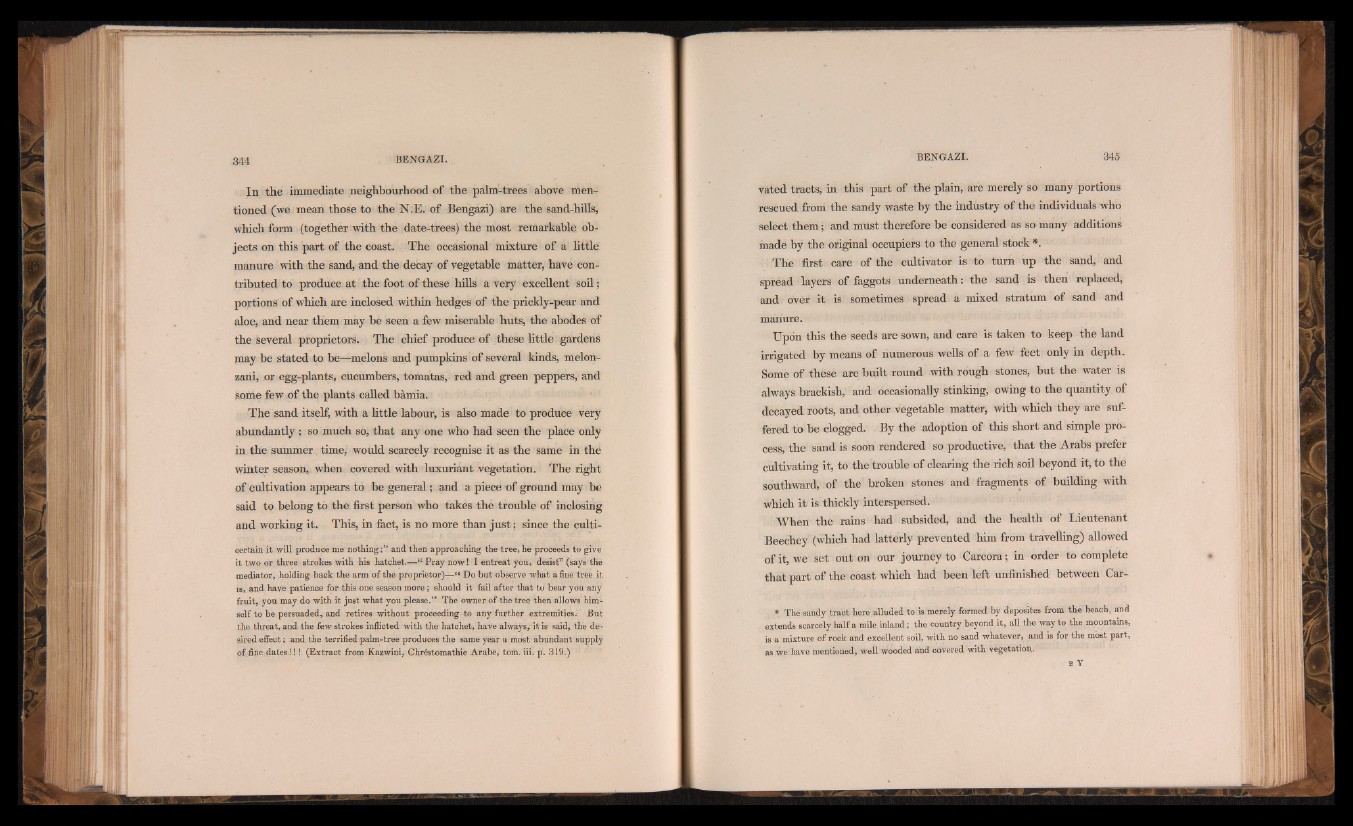
In the immediate neighbourhood of the palm-trees above mentioned
(we mean those to the N.E. of Bengazi) are the sand-hills,
which form (together with the date-trees) the most remarkable objects
on this part of the coast. The occasional mixture of a little
manure with the sand, and the decay of vegetable matter, have contributed
to produce at the foot of these hills a very excellent soil;
portions of which are inclosed within hedges of the prickly-pear and
aloe, and near them may be seen a few miserable huts, the abodes of
the several proprietors. The chief produce of these little gardens
may be stated to be—melons and pumpkins of several kinds, melon-
zani, or egg-plants, cucumbers, tomatas, red and green peppers, and
some few of the plants called bámia.
The sand itself, with a little labour, is also made to produce very
abundantly; so much so, that any one who had seen the place only
in the summer time, would scarcely recognise it as the same in the
winter season, when covered with luxuriant vegetation. The right
of cultivation appears to be general; and a piece of ground may be
said to belong to the first person who takes the trouble of inclosing
and working it. This, in fact, is no more than ju s t; since the culticertain
it will producé me nothing;” and then approaching the tfee* he proceeds to give
it two or three strokes with his hatchet.—w Pray now! I entreat you, desist” (says'the
mediator, holding back the arm of the proprietor)—-** Do but observe what afine tree it
is, and have patience for this one season more; should it fail after that to bear you any
fruit, you may do with it just what you please.” The owner of the tree then allows himself
to be persuaded, and retires without proceeding to any further extremities. But
the threat, and the few strokes inflicted with the hatchet, have always, it is said, the desired
effect; and the terrified palm-tree produces the same year a most abundant supply
pf fine dates!!! (Extract from Kazwini,- Chréstomathie Arabe, tom. íii¿ p. 319.)
vated tracts, in this part of the plain, are merely so many portions
rescued from the sandy wáste by the industry of the individuals who
select them; and must therefore be considered as so many additions
made by the original occupiers to the general stock *.
The first care of the cultivator is to turn up the sand, and
spread layers of faggots underneath: the sand is then replaced,
and over it is sometimes spread a mixed stratum of sand and
mánure.
Upon this the seeds are sown, and care is taken to keep the land
irrigated by means of numerous wells of a few feet only in depth.
Some of these are built round with rough stones, but the water is
always brackish, and occasionally stinking, owing to the quantity of
decayed roots, and other vegetable matter, with which they are suffered
to be clogged. By the adoption of this short and simple process,
the sand is soon rendered so productive, that the Arabs prefer
cultivating it, to the trouble of clearing the rich soil beyond it, to the
southward, of the broken stones and fragments of building with
which it is thickly interspersed.
When the rains had subsided, and the health of Lieutenant
Beechey'(which had latterly prevented him from travelling) allowed
of it, we set out on our journey to Carcora; in order to complete
that part of the coast which had been left unfinished between Car-
* The sandy tract herealluded to is merely formed by deposites from the beach, and
extends scarcely half a mile inland; the country beyond it, all the way to the mountains,
is a mixture of rock and excellent soil, with no sand whatever, and is for the most part,
as we have mentioned, well wooded and covered with vegetation.